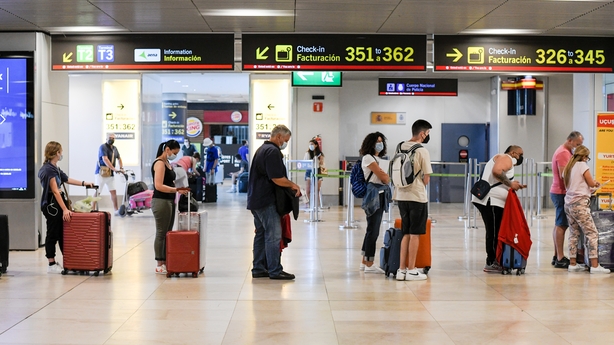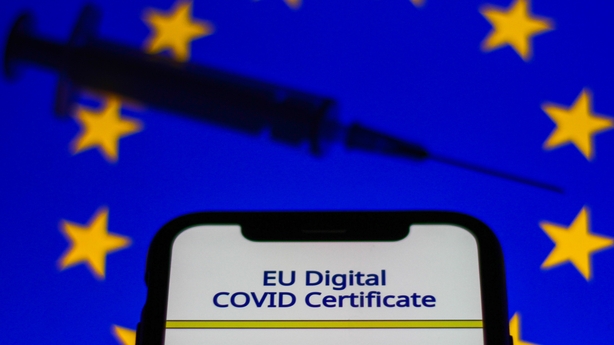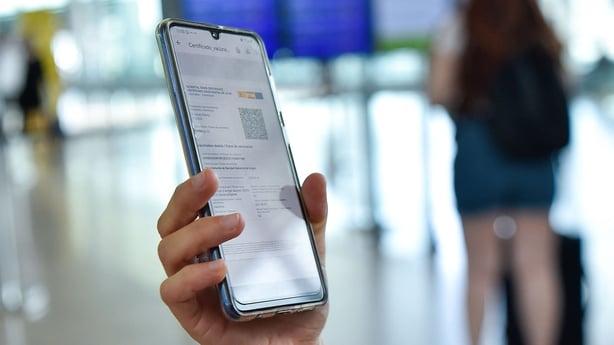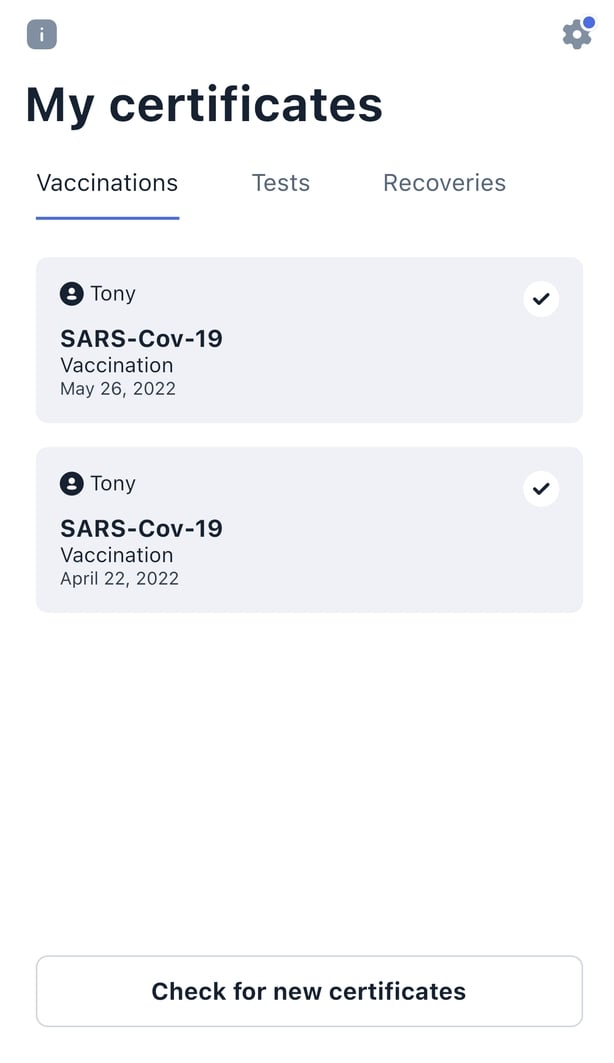Creating a European-wide digital certificate to unlock travel and tourism was a top priority for the European Union after the much-criticized vaccine was introduced earlier this year.
Legislation was agreed to create a digital platform that all 27 member states could deliver in record time (62 days).
«The European Union delivers its services to its citizens,» European Commission President Ursula von der Leyen said at her launch on July 1.
«We are helping Europeans regain the freedom they value and value so much.»
However, the Covid Digital Certification (DCC) has faced a stormy downstream.
Countries such as Italy, Spain, Portugal and Greece that rely heavily on tourism have made it difficult to have a single European-wide system that would revive their devastated travel sectors.
They had no qualms about calling the certificate, which would record if someone had been vaccinated, had a negative Covid test, or evidence of recovery, a «passport.»
Other member states were more careful and wanted the certificate to be a medical document, not a file Give Way for travel.
There were concerns about discrimination against those who had not been vaccinated or who had not yet been vaccinated is being vaccination. In early spring, vaccination levels were no longer what they are today, and it wasn’t clear whether or not you could transmit the virus even if you were vaccinated.
But the certification took shape, and underwent various name changes, as it worked its way from being a Commission proposal to a new law, approved by member states and the European Parliament.
While Parliament has pushed the utmost effort to make certification related to restoring freedom of movement for citizens, member states have called for strong discretionary elements, including the use of emergency brakes if there is a sudden and sharp rise in infections, or a new variant, in another member state.
The initial proposal was submitted by the European Commission on 14 March and an interim agreement was reached between the member states and the European Parliament on 20 May.
On 14 June, a joint statement by the heads of the three EU institutions – the Commission, the Council and Parliament – declared that certification is an order that «will once again enable citizens to enjoy these tangible and cherished rights in the EU – the right to free movement».
Member states also agreed to a non-binding recommendation that would limit potential restrictions to those who cannot demonstrate immunity, either through a vaccine or previous infection, and who have traveled from a high-risk area.

The digital platform, which will essentially allow national systems to connect to an EU-wide platform, was launched on June 1, but was officially rolled out on July 1.
There was a six-week transition period for member states that needed more time to develop the system.
The certificate includes a QR code and must be available in every language. Certificate holders should not be subject to testing or quarantine upon arrival in another member state (non-EU countries such as Norway, Iceland and Liechtenstein have also taken part in the scheme).
«Member states should refrain from imposing additional travel restrictions on EU Covid digital certificate holders, unless they are necessary and proportionate to protect public health,» the Commission said in a statement on June 14.
In addition, the Commission has pledged €100 million to help member states provide affordable PCR tests.
But within the scope of the DCC, there are a lot of caveats and terms that can be confusing for some time.
Member states must accept all vaccines approved by the European Medicines Agency (EMA), such as AstraZeneca, BioNTech/Pfizer, Moderna and Johnson & Johnson, but they have discretion to accept other vaccines, such as the Russian Sputnik vaccine.
A tourist may receive only one vaccination dose, and this is recorded on the certificate. However, whether that is sufficient to avoid quarantine on arrival depends on the member state, and whether the traveler is coming from a high-risk country.
Likewise, a country can insist that a visitor still test negative for Covid before travel if the visitor is from an area identified by the European Center for Disease Prevention and Control (ECDC) as high risk.
The European Center for Disease Control and Prevention has created a colour-coded risk guide, from green (safe), to orange (medium risk), to red (high risk), to dark red (high risk), to gray, which means a lack of information.
Travelers from a green area should not face travel restrictions, but those coming from an orange, red or gray area still faced the need to be tested for Covid before departure.
According to an agreed-upon approach to the types of tests required, a PCR test should be performed a maximum of 72 hours prior to arrival, while a rapid antigen test is valid for 48 hours.
Despite having all the pieces in place, member states wouldn’t be shy about pulling the emergency brake.
Germany has already imposed restrictions on arrivals from Portugal due to the high number of delta divergence cases there, and Belgium is believed to be considering something similar.
However, given that the ECDC believes that by the end of August, 90% of all cases in Europe will be delta-type, it is difficult to see member states pull the emergency brake that much.
Meanwhile, the European Commission is in talks with the UK, US and Switzerland about recognizing national vaccination and testing certificates.
But there are still problems with growth.
Airlines have complained that they have to approve certificates of passengers at check-in without having the proper scanning equipment, and that when they have the correct equipment, they may not recognize the QR code of a passenger who was inexplicably doubly vaccinated.
This may be because the destination country still applies some restrictions, depending on where the traveler is coming from.
Thomas Rennert, managing director of Airlines4Europe, has argued that the DCC should be charged by customers at online check-in, and not presented when the passenger arrives at the airport.
“Airlines today still lack tools and equipment,” said Mr. Reinart. “This equipment has to be given by national authorities to do the survey if necessary. That is one issue.”
“Also, the way the code is verified is done in very different ways. Some countries have gone through the national health screening platform, which is very useful, so that people can verify their code before they arrive at the airport.
«This is the ideal situation,» he said.
Ultimately, he said, member states should be strictly guided by the ECDC risk map when operating the QR code verification system.
The problems reflect the diverse approach to health data in different Member States.
In Belgium, where this reporter is based, medical data can be accessed through a secure authentication app called Itsme.
When the Belgian authorities developed the CovidSafe app, all citizens could transfer health data to the app via Itsme certification tool.
When I downloaded the app, the two Pfizer vaccines – from April 22 and May 26 – automatically appeared on the CovidSafe app, along with any new negative Covid test results.
The European Commission acknowledged that there were some problems emerging, but noted that with 230 million certificates issued so far, there had been relatively few problems.
The Commission also explains that although Ireland’s system is not yet operational, immigration authorities are still obligated to recognize EU certificates when presented at ports and airports.
«The list is very clear,» said UNHCR spokesman Christian Wiegand.
“The transitional period applies only to the question of which member state issues certificates to its citizens residing in it. At the same time, all member states, since 1 July, are obligated to accept the pan-European version of certificates.
«Honestly, there is no reason not to do this because it is a safe and secure system.»
But there are still many pitfalls.
Irish passengers arrive in Brussels via a non-Schengen pier. That could cause confusion among airport police who normally used to handle non-EU traffic, which now include British passengers, whose vaccination credentials do not necessarily comply with the EU system.
Officials at Brussels Airport insist passport control officials should be able to tell the difference.
Travelers from Schengen countries arriving in Brussels do not face any controls. This means that the authorities have been increasingly random checks on Schengen traffic for Covid certificates, but these are by no means all-day controls.

«Lector profesional. Jugador galardonado. Aficionado a los zombis. Adicto a las redes sociales. Experto en tocino. Erudito en Internet»


